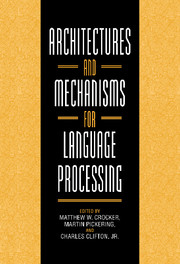Preface
Published online by Cambridge University Press: 03 October 2009
Summary
The chapters in the present volume constitute a selection from the papers presented at AMLaP-95, the first conference on “Architectures and Mechanisms for Language Processing.” AMLaP-95 came about when members of the Human Communication Research Centre at the Universities of Edinburgh and Glasgow decided to have a small workshop in which a few psycholinguists from the United States could get together with a few European researchers and share research ideas. These organisers envisioned a meeting of researchers who are particularly interested in interdisciplinary approaches to psycholinguistics, researchers who could discuss their progress in bringing techniques of experimental psychology, linguistics, and computer science to bear on questions of how people understand and produce language.
An announcement of the workshop resulted in an unexpectedly large number of enthusiastic responses and requests to participate, and the small workshop grew into a two-day conference in Edinburgh, with invited and presented papers and two poster sessions. It quickly became clear that there was a demand in Europe for a meeting like AMLaP-95, a need similar to that met by the annual CUNY Conference on Human Sentence Processing in the United States.
The AMLaP meeting emphasises bringing computational, linguistic, and psychological perspectives to bear on questions of language processing. Its scope covers a broader range of topics, from word recognition to discourse comprehension, in addition to sentence processing.
- Type
- Chapter
- Information
- Architectures and Mechanisms for Language Processing , pp. ix - xPublisher: Cambridge University PressPrint publication year: 1999



